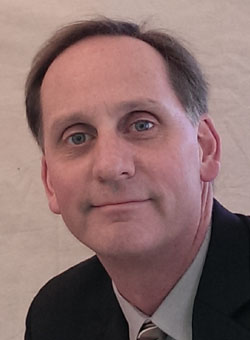
| Event Details |
|---|
|
Tuesday, April 15, 2014 Talk:
4, Avery 115
Reception:
3:30 p.m., Avery 348
|
Richard Voyles, Ph.D. - Distinguished Speaker
Associate Dean for Research, Purdue UniversityAbstract
Robotics and manufacturing are surging in interest and popularity. Recent interest in re-shoring manufacturing capacity and capability, buoyed by technological advances in robotics for home healthcare and automation, has created a "conundrum of success": do we have the infrastructure to support the expectations?
Universities are uniquely positioned at the intersection of research, education, and innovation. At Purdue, we've launched the Robotics Accelerator, a new center to promote the discovery, creation, and implementation of robotics knowledge, artifacts, and solutions. As a researcher in the center, I will describe representative projects from my own activities in mechanical, electrical and computational studies. The CRAWLER (a.k.a. TerminatorBot), a small, crawling robot for penetrating rubble in collapsed-structure search and rescue, is evolving into the MOTHESHIP, a serpentine tread/limb hybrid robot for locomoting across the rubble. At the computational core of both these robots is the RecoNode, a custom node for high performance wireless control networks. These infrastructural nodes extend our self-adaptive architecture to include both reconfigurable software and reconfigurable hardware. Finally, our neuromorphic architecture is based on fully-interconnected Synthetic Neural Networks, which implement parallel artificial neurons from polymer electronics. From these we are developing meta-materials we call structured computational polymers. As Director of the center, I will muse on observations of workforce development and innovation trends that bode ominously for automation, yet offer opportunities for universities.
Universities are uniquely positioned at the intersection of research, education, and innovation. At Purdue, we've launched the Robotics Accelerator, a new center to promote the discovery, creation, and implementation of robotics knowledge, artifacts, and solutions. As a researcher in the center, I will describe representative projects from my own activities in mechanical, electrical and computational studies. The CRAWLER (a.k.a. TerminatorBot), a small, crawling robot for penetrating rubble in collapsed-structure search and rescue, is evolving into the MOTHESHIP, a serpentine tread/limb hybrid robot for locomoting across the rubble. At the computational core of both these robots is the RecoNode, a custom node for high performance wireless control networks. These infrastructural nodes extend our self-adaptive architecture to include both reconfigurable software and reconfigurable hardware. Finally, our neuromorphic architecture is based on fully-interconnected Synthetic Neural Networks, which implement parallel artificial neurons from polymer electronics. From these we are developing meta-materials we call structured computational polymers. As Director of the center, I will muse on observations of workforce development and innovation trends that bode ominously for automation, yet offer opportunities for universities.
Speaker Bio
Dr. Voyles has been involved in robotics and cyber-physical systems most of his academic and professional life. He is currently the Associate Dean for Research in the College of Technology at Purdue University as well as the founding director of the Purdue Robotics Accelerator. Concurrently, he is serving the Office of Science and Technology Policy at the White House as Assistant Director of Robotics and Cyber-Physical Systems. Prior to this appointment, he was lead Program Director at the National Science Foundation running the National Robotics Initiative and was one of the founding PDs of the Innovation Corps program.
Prof. Voyles’ formal training mirrors the pillars of robotics, having received the B.S. in Electrical Engineering from Purdue University in 1983, the M.S. in Manufacturing Systems Engineering from the Department of Mechanical Engineering at Stanford University in 1989, and the Ph.D. in Robotics from the School of Computer Science at Carnegie Mellon University in 1997. He has been Associate Professor of Computer Science at the University of Minnesota and Associate Professor of Electrical and Computer Engineering at the University of Denver as well as Site Director of the NSF Safety, Security, and Rescue Research Center, an NSF I/UCRC. Dr. Voyles’ research interests are in the areas of robotics and artificial intelligence. Specifically, he is interested in the development of small, resource-constrained robots and robot teams for urban search and rescue and surveillance as well as new generations of materials and co-robots for intelligent, human-assistive tasks. Dr. Voyles has additional expertise in sensors and sensor calibration, particularly haptic and force sensors, and real-time control. Dr. Voyles’ industrial experience includes Dart Controls, IBM Corp., Integrated Systems, Inc., Avanti Optics and Mark V Automation Corp. He has also served on the boards of various start-ups and non-profit groups.
Prof. Voyles’ formal training mirrors the pillars of robotics, having received the B.S. in Electrical Engineering from Purdue University in 1983, the M.S. in Manufacturing Systems Engineering from the Department of Mechanical Engineering at Stanford University in 1989, and the Ph.D. in Robotics from the School of Computer Science at Carnegie Mellon University in 1997. He has been Associate Professor of Computer Science at the University of Minnesota and Associate Professor of Electrical and Computer Engineering at the University of Denver as well as Site Director of the NSF Safety, Security, and Rescue Research Center, an NSF I/UCRC. Dr. Voyles’ research interests are in the areas of robotics and artificial intelligence. Specifically, he is interested in the development of small, resource-constrained robots and robot teams for urban search and rescue and surveillance as well as new generations of materials and co-robots for intelligent, human-assistive tasks. Dr. Voyles has additional expertise in sensors and sensor calibration, particularly haptic and force sensors, and real-time control. Dr. Voyles’ industrial experience includes Dart Controls, IBM Corp., Integrated Systems, Inc., Avanti Optics and Mark V Automation Corp. He has also served on the boards of various start-ups and non-profit groups.